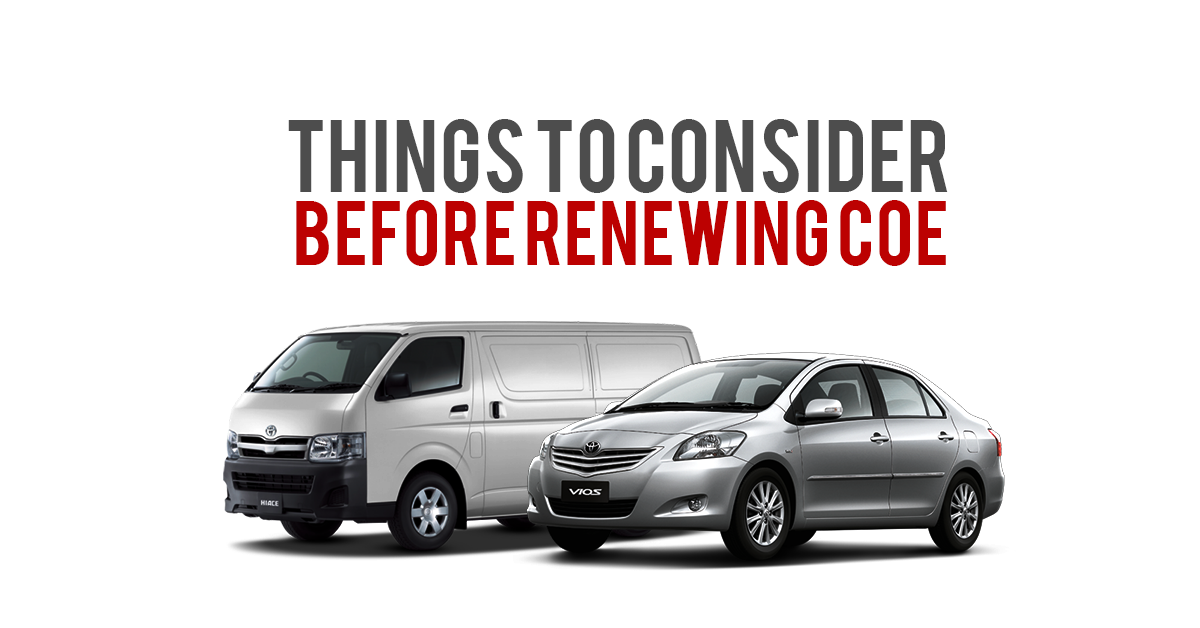Things to consider before renewing your car

Your car’s COE is expiring soon and you are caught in a dilemma of whether to renew its COE or to deregister your car? On one hand, you can’t bear to part with your beloved ride, on the other hand, you are tempted to get a new ride (especially when COE premium is at a low now). Before you decide, ask yourself these 4 questions:
The first thing you need to take note is that your car’s PARF rebate will be forfeited once you choose to renew your car’s COE.
| Age at Deregistration | PARF Rebate |
| Not exceeding 5 years | 75% of ARF paid |
| Above 5 but not exceeding 6 years | 70% of ARF paid |
| Above 6 but not exceeding 7 years | 65% of ARF paid |
| Above 7 but not exceeding 8 years | 60% of ARF paid |
| Above 8 but not exceeding 9 years | 55% of ARF paid |
| Above 9 but not exceeding 10 years | 50% of ARF paid |
| Above 10 years | Nil |
With reference to the table above, PARF rebate is calculated based on the age of your car at the point of deregistration. If you choose to scrap your car at the end of 10 years, you will get a PARF rebate equivalent to 50% of ARF paid. Generally speaking, it is worth to renew a car with low PARF rebate such as Honda Fit or Toyota Vios.
2. Do you mind paying higher road tax?
| Age of Vehicle | Annual Road Tax Surcharge |
| More than 10 years old | 10% of Road Tax |
| More than 11 years old | 20% of Road Tax |
| More than 12 years old | 30% of Road Tax |
| More than 13 years old | 40% of Road Tax |
| More than 14 years old | 50% of Road Tax |
As shown in the above table, there will be a road tax surcharge for vehicle more than 10 years old. Once you renew your car, your road tax will increase by 10% each year, up to a maximum of 50%.
3. Renew for 5 or 10 years?
You do not need to bid for a new COE if you choose to renew your car. Instead, you will pay the Prevailing Quota Premium (PQP) at the point of renewal. The PQP is calculated based on the average COE premium for the last 3 months (or last 6 bids). Please refer to the latest COE results to view the existing PQP.
For 5 years renewal, you are required to pay half of the existing PQP. One thing to note is that if you renew your car for 5 years, you will not be able to renew it again at the end of 5 years. Therefore, if you can afford, we always recommend to go for 10 years renewal. After all, if you decide to scrap your car at any point of time, LTA will rebate the “unused” COE amount.
For commercial vehicle, you are allowed to renew for 5 years. After 5 years, you will have the option to continue for another 5 years renewal, subject to the vehicle’s statutory lifespan. Goods vehicles and buses have a statutory lifespan of 20 years.
4. Is your car “healthy” to last for another 5 to 10 years?
You should know the condition of your car better than anyone else. If your car is well-maintained and low mileage, then go ahead with renewing its COE.
If you are unsure, get a mechanic to check if the car is ready for COE renewal. You can’t escape from general wear and tear parts replacement for a 10-year-old car. However, if there is major wear and tear that require a hefty sum of money to repair, then you might want to consider if the money would be better spent on a new car instead. Getting a new car would at least give you a peace of mind and problem free for the next 3 – 5 years.
If you are still unsure of whether to renew your COE, feel free to call Speed Credit at 6444 4400 to speak to our qualified consultant. We would be more than happy to answer any questions you might have regarding the COE renewal process. If you have decided to proceed with COE renewal, we provide 100% COE loan with flexible repayment options. Submit your enquiry to get a quote from us today.
If you have decided to retire your current ride and get a new car, check out the latest new car promotion here.
